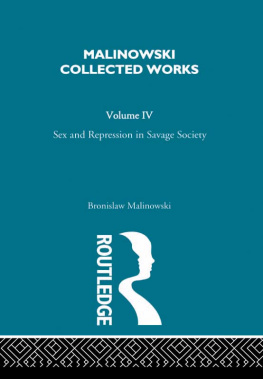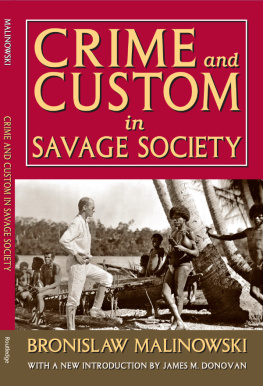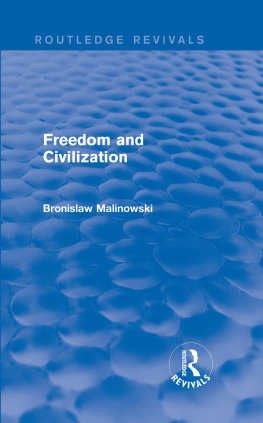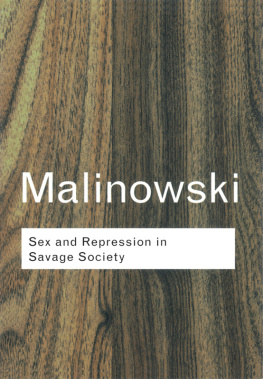Malinowski - Crime and Custom in Savage Society [VOL 3
Here you can read online Malinowski - Crime and Custom in Savage Society [VOL 3 full text of the book (entire story) in english for free. Download pdf and epub, get meaning, cover and reviews about this ebook. publisher: Taylor & Francis (CAM), genre: Romance novel. Description of the work, (preface) as well as reviews are available. Best literature library LitArk.com created for fans of good reading and offers a wide selection of genres:
Romance novel
Science fiction
Adventure
Detective
Science
History
Home and family
Prose
Art
Politics
Computer
Non-fiction
Religion
Business
Children
Humor
Choose a favorite category and find really read worthwhile books. Enjoy immersion in the world of imagination, feel the emotions of the characters or learn something new for yourself, make an fascinating discovery.
- Book:Crime and Custom in Savage Society [VOL 3
- Author:
- Publisher:Taylor & Francis (CAM)
- Genre:
- Rating:3 / 5
- Favourites:Add to favourites
- Your mark:
- 60
- 1
- 2
- 3
- 4
- 5
Crime and Custom in Savage Society [VOL 3: summary, description and annotation
We offer to read an annotation, description, summary or preface (depends on what the author of the book "Crime and Custom in Savage Society [VOL 3" wrote himself). If you haven't found the necessary information about the book — write in the comments, we will try to find it.
Crime and Custom in Savage Society [VOL 3 — read online for free the complete book (whole text) full work
Below is the text of the book, divided by pages. System saving the place of the last page read, allows you to conveniently read the book "Crime and Custom in Savage Society [VOL 3" online for free, without having to search again every time where you left off. Put a bookmark, and you can go to the page where you finished reading at any time.
Font size:
Interval:
Bookmark:
COLLECTED WORKS
MALINOWSKI: COLLECTED WORKS
VOLUME I
Malinowski Among the Magi
VOLUME II
Argonauts of the Western Pacific
VOLUME III
Crime and Custom in Savage Society
VOLUME IV
Sex and Repression in Savage Society
VOLUME V
The Father in Primitive Psychology
Myth in Primitive Psychology
VOLUME VI
The Sexual Life of Savages in North-Western Melanesia
VOLUME VII
Coral Gardens and Their Magic I
VOLUME VIII
Coral Gardens and Their Magic II
VOLUME IX
A Scientific Theory of Culture and Other Essays
VOLUME X
Man and Culture
Edited by Raymond Firth
MALINOWSKI
COLLECTED WORKS
VOLUME III
CRIME AND CUSTOM IN
SAVAGE SOCIETY
Bronislaw Malinowski

First published 1926 by Kegan Paul, Trench, Trubner & Co. Ltd
Reprinted 2002 by Routledge
2 Park Square, Milton Park, Abingdon, Oxon OX14 4RN
Simultaneously published in the USA and Canada
by Routledge
270 Madison Avenue, New York, NY 10016
Transferred to Digital Printing 2004
Routledge is an imprint of the Taylor & Francis Group
Typeset in Times New Roman by Keystroke, Jacaranda Lodge, Wolverhampton Printed and bound in Great Britain by Antony Rowe Ltd, Chippenham, Wiltshire
All rights reserved. No part of this book may be reprinted or reproduced or utilised in any form or by any electronic, mechanical, or other means, now known or hereafter invented, including photocopying and recording, or in any information storage or retrieval system, without permission in writing from the publishers.
British Library Cataloguing in Publication Data A catalogue record for this book is available from the British Library
Library of Congress Cataloging in Publication Data
A catalog record for this book has been requested
ISBN 0-415-21671-0 (set)
ISBN 0-415-26245-3 (volume III)
Publisher's Note
The publisher has gone to great lengths to ensure the quality of this reprint but points out that some imperfections in the original book may be apparent.
Printed and bound by Antony Rowe Ltd, Eastboume
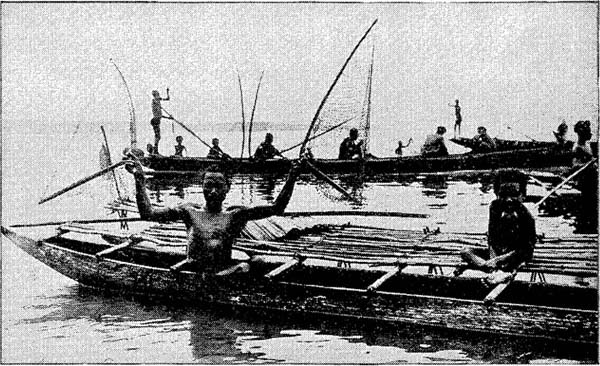
(See )
[Front]
Crime and Custom in Savage Society
By
BRONISLAW MALINOWSKI, D.Sc.
Author of Argonauts of the Western Pacific
LONDON
KEGAN PAUL, TRENCH, TRUBNER & CO. LTD.
BROADWAY HOUSE: 6874 CARTER LANE, E.C.
1940
To
SIR RICHARD GREGORY, D.Sc.
Editor of Nature
| PLATE |
T HE modern anthropological explorer, who goes into the field fully trained in theory, charged with problems, interests, and maybe preconceptions, is neither able nor well-advised to keep his observations within the limits of concrete facts and detailed data. He is bound to receive illumination on matters of principle, to solve some of his fundamental difficulties, to settle many moot points as regards general perspective. He is bound, for example, to arrive at some conclusions as to whether the primitive mind differs from our own or is essentially similar; whether the savage lives constantly in a world of supernatural powers and perils, or on the contrary, has his lucid intervals as often as any one of us; whether clan-solidarity is such an overwhelming and universal force, or whether the heathen can be as self-seeking and self-interested as any Christian.
In the writing up of his results the modern anthropologist is naturally tempted to add his wider, somewhat diffused and intangible experiences to his descriptions of definite fact; to present the details of custom, belief, and organization against the background of a general theory of primitive culture. This little book is the outcome of a field worker's yielding to such temptation. In extenuation of this lapse if lapse it beI should like to urge the great need for more theory in anthropological jurisprudence, especially theory born from actual contact with savages. I should also point out that in this work reflections and generalizations stand out clearly from the descriptive paragraphs. Last, not least, I should like to claim that my theory is not made is conjecture or hypothetical reconstruction but is simply an attempt at formulating the problem, at introducing precise concepts and clear definitions into the subject.
The circumstances under which this thesis came into being have also contributed towards its present form. The material was first prepared and the conclusions framed in response to an invitation from the Royal Institution of Great Britain, before which a paper was read (on the Forces of Law and Order in a Primitive Community) on Friday evening, 13th February, 1925. As often happens, I found myself with more material on my hands and many more conclusions framed than could be included in an hour's address. Some of these I have had the privilege of publishing in Nature (see Supplement, 6th February, 1926, and article, 15th August, 1925). The full version is contained in this little book.
I wish to express my thanks to the Council of the Royal Institution for the kind loan of blocks and the permission to reproduce them. To Sir Richard Gregory, the Editor of Nature, I am indebted for allowing me to reprint the articles mentioned. I owe him much, moreover, for the help and encouragement I received from him in my earlier work.
In the preparation of this volume I received competent assistance from Mr. Raymond Firth, who is carrying on research work at the London School of Economics in the Department of Ethnology. I was able to secure his help through a grant from the Laura Spelman Rockefeller Memorial. The Board of this institution has of late devoted some special attention to the furtherance of anthropology, as a part of its interest in the development of the social sciences. The study of the rapidly vanishing savage races is one of those duties of civilizationnow actively engaged in the destruction of primitive lifewhich so far has been lamentably neglected. The task is not only of high scientific and cultural importance, but also not devoid of considerable practical value, in that it can help the white man to govern, exploit, and improve the native with less pernicious results to the latter.
The Laura Spelman Rockefeller Memorial, through its enlightened interest in anthropology as a branch of the social studies, will earn a deep gratitude from present and future humanists in erecting a lasting monument to the noble woman in whose memory it has been founded.
B. M.
NEW YORK CITY .
March, 1926.
A NTHROPOLOGY is still to most laymen and to many specialists mainly an object of antiquarian interest. Savagery is still synonymous with absurd, cruel, and eccentric customs, with quaint superstitions and revolting practices. Sexual licence, infanticide, head-hunting, couvade, cannibalism and what not, have made anthropology attractive reading to many, a subject of curiosity rather than of serious scholarship to others. There are, however, certain aspects of anthropology which are of a genuine scientific character, in that they do not lead us beyond empirical fact into realms of uncontrollable conjecture, in that they widen our knowledge of human nature, and are capable of a direct practical application. I mean such a subject, for example, as primitive economics, important for our knowledge of man's economic disposition and of value to those who wish to develop the resources of tropical countries, employ indigenous labour and trade with the natives. Or again, a subject such as the comparative study of the mental processes of savages, a line of research which has already proved fertile to psychology and might be made useful to those engaged in educating or morally improving the native. Last, but not least, there is the subject of primitive law, the study of the various forces which make for order, uniformity and cohesion in a savage tribe. The knowledge of these forces should have formed the foundation of anthropological theories of primitive organization and should have yielded the guiding principles of Colonial legislation and administration. A fuller knowledge of the so-called savages has revealed Ye beastly devices of Ye heathen as the product of firm law and of strict tradition, due to biological, mental and social needs of human nature, rather than as the outcome of unbridled passion and unfettered excess. Law and order pervade the tribal usages of primitive races, they govern all the humdrum course of daily existence, as well as the leading acts of public life, whether these be quaint and sensational or important and venerable. Yet of all branches of anthropology, primitive jurisprudence has received in recent times the scantiest and the least satisfactory treatment.
Font size:
Interval:
Bookmark:
Similar books «Crime and Custom in Savage Society [VOL 3»
Look at similar books to Crime and Custom in Savage Society [VOL 3. We have selected literature similar in name and meaning in the hope of providing readers with more options to find new, interesting, not yet read works.
Discussion, reviews of the book Crime and Custom in Savage Society [VOL 3 and just readers' own opinions. Leave your comments, write what you think about the work, its meaning or the main characters. Specify what exactly you liked and what you didn't like, and why you think so.



